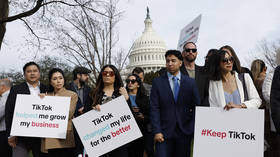US government moves closer to banning TikTok

The US House of Representatives on Wednesday passed a bill that would force TikTok’s Chinese owner to sell the platform or face a nationwide ban. Critics have objected that such a move would open the door to unconstitutional censorship.
The final vote was 352-65, with a total of 197 Republicans and 155 Democrats in favor of the bill and 15 and 50 against, respectively. The bill now goes to the Senate. If it passes, President Joe Biden said he would sign it.
“We have given TikTok a clear choice,” said Cathy McMorris Rodgers, a Republican congresswoman from Washington state. “Separate from your parent company ByteDance, which is beholden to the [Communist Party of China] and remain operational in the United States, or side with the CCP and face the consequences.”
The premise of the ban is that TikTok represents a “national security threat” because ByteDance is a company related to China. Another Republican, Thomas Massie of Kentucky, called the bill “a cure that is worse than the disease.”
Massie has previously argued the bill was a “Trojan horse” that would give the White House the power to ban websites and apps. The owner of X (formerly Twitter) Elon Musk agreed, saying the bill is “about censorship and government control!”
Former Republican presidential candidate Vivek Ramaswamy also argued that those worried about Biden’s censoring his political opponents shouldn’t give him “even greater executive authority to do more of it in the name of national security.”
The American Civil Liberties Union (ACLU) denounced the proposal as “violating the free speech rights of millions of Americans who use the platform daily to communicate and stay informed.”
According to the Wall Street Journal, the bill’s sponsors – Wisconsin Republican Mike Gallagher and Illinois Democrat Raja Krishnamoorthi – worked with Deputy Attorney General Lisa Monaco and the White House’s National Security Council to craft the legislation, which is how it got support from the Democrats. The Biden administration also advised the lawmakers on how to write the bill to protect it from First Amendment lawsuits.
The WSJ also revealed that the effort to ban TikTok came together after October 7 after Israel’s supporters in Congress and Silicon Valley became “concerned” about what they called pro-Hamas and “antisemitic” content on the platform.
TikTok spokesman Alex Haurek issued a statement after the vote noting that the bill was rushed through as part of a secretive process.
“We are hopeful that the Senate will consider the facts, listen to their constituents, and realize the impact on the economy, seven million small businesses, and the 170 million Americans who use our service,” he said.
The top Democrat and Republican on the Senate Intelligence Committee have already issued a statement saying they were “united in our concern about the national security threat posed by TikTok” and intend to advance the ban.













